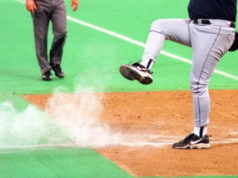
Nine times out of 10, a bad resumé will land in the “circular file” before the first half is read. Some bad resumés are just too good to throw away, though, and could end up displayed prominently in someone’s office for everyone’s amusement. Take for example the following resumé items:
“I am extremely loyal to my present firm, so please don’t let them know of my immediate availability.”
“Please don’t misconstrue my 14 jobs as ‘job-hopping.’ I have never quit a job.”
“Goal: To get a job that will help my resumé look better.”
If you’re serious about advancing your officiating career, you need a resumé that won’t land in the nearest trash can – or worse, posted on someone’s wall.
When it comes to your officiating resumé, you should take it no less seriously than your normal career resumé. An officiating resumé probably won’t get you a job, but it might get you a look. Think of it this way: If the goal of a regular resumé is to get a job seeker an interview, then the goal of an officiating resumé is get an assigner or supervisor interested enough to take a look at your skills.
Considering that many supervisors feel the same way, getting them to come watch you work will go a long way toward advancing your career. That’s where your officiating resumé needs to do its job.
Like any resumé, your officiating resumé has to pass the assigner or supervisor’s screening process (requisite competition levels, number of years’ experience, etc.), to give basic facts intended to influence the assigner or supervisor (conferences worked, postseason assignments, camps/clinics attended, etc.) and to provide up-to-date contact information (address, telephone, cell phone, e-mail, etc.).
If done right, it also will establish you as a professional person with high standards and excellent skills, based on the fact that the resumé is so well done (clear, well-organized, well-written, well-designed).
Referee contacted various high school and college-level assigners and supervisors and asked them what they look for in an official’s resumé. Turn the page for the details.
Keep It Short
A resumé is an introduction, not a chapter and certainly not a novel. Nearly every assigner and supervisor contacted for this story indicated that no resumé should be any longer than one-and-a-half pages in length and preferably only one page.
Goals And Philosophy
Many resumés start with a stated goal that can be tailored to whichever league or conference you’re trying to break into. In addition, it’s a good idea to write a brief statement of your officiating philosophy. That’s not to say you should describe how you officiate, more why you officiate.
The Basics
Every resumé should have the absolute bare essentials. In addition to your name (duh!), address, phone numbers, e-mail, etc., a bare-bones, no-frills officiating resumé “should include the highest level officiated, the most recent level officiated and the number of years officiated,” as Don Collins, retired commissioner of the California Interscholastic Federation-San Francisco Section, puts it. Anything beyond that is gravy.
Show Your Commitment
Your resumé must make a strong case for why you’re better than the next guy. Russ Thomas, retired athletic administrator for Milwaukee Public Schools, wants to see a list of “continuing education highlights, including camps and clinics attended either as a presenter or participant.” When it comes down to a choice between you and the next guy with everything else being equal, the official who demonstrates a commitment to the craft gets the nod.
Make It Meaningful
Include only the information that will be helpful to an assigner or supervisor. “Include job constraints,” says Dennis Kostac, president of the Green Bay (Wis.) Officials Association. “(But) I do not want to hear restrictions that officials have because of travel. I expect officials to work all sites in my conferences unless they have relatives or other personal connections to a school.”
Getting Personal
Some personal info is a fine addition as long as you keep it brief and don’t get too personal. Listing your day job and community involvement is fine. Listing the number of times you’ve been divorced, your dog’s name and religious preferences is not fine. Boucher says he likes to know” a little personal history/information outside of officiating (to get a sense of) character and community standing.”
References
References are a must, and if you can fit them right on your resumé (as opposed to an attachment), all the better. Who should you use for references? Stick with people the assigner or supervisor is likely familiar with.
Movin’ On Up
When tailoring your resumé to a particular league or conference, it’s not a bad idea to attach your current officiating schedule for that sport, especially if you’re looking to move up a level.
What's Your Call? Leave a Comment:
Note: This article is archival in nature. Rules, interpretations, mechanics, philosophies and other information may or may not be correct for the current year.
This article is the copyright of ©Referee Enterprises, Inc., and may not be republished in whole or in part online, in print or in any capacity without expressed written permission from Referee. The article is made available for educational use by individuals.


















